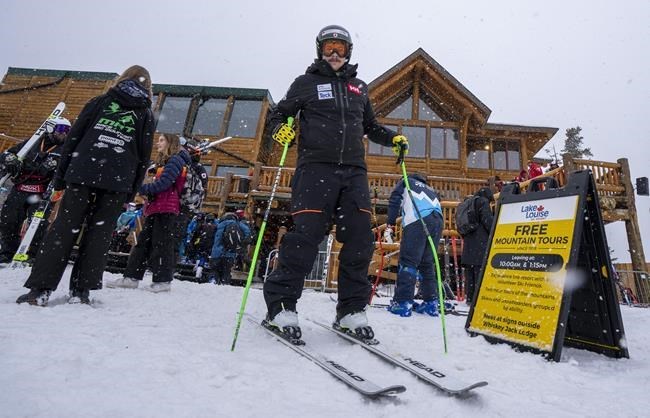LAKE LOUISE, Alta. — James Crawford wants to put the tools he learned from his breakout ski racing season into constantly challenging for the podium.
The 25-year-old from Toronto became just the fourth Canadian man to win an Olympic medal in alpine skiing with a combined bronze in February in Beijing.
Combined is determined by the results of a slalom and a downhill run. Crawford was circling the Olympic podium before his bronze by finishing fourth in downhill and sixth in super-G in China.
"The Olympic medal was a huge part of my season, and it's something that I'll definitely cherish," Crawford said.
A super-G silver in Kvitfjell, Norway, in March was Crawford's first podium among six top-10 World Cup results he achieved in 2021-22 across downhill and super-G.
"The consistency I've managed to get is something that I've worked toward my whole career," Crawford told The Canadian Press.
"It was kind of just years and years of figuring out what it actually took, and then once I figured out on a day-to-day basis what you needed to do to put down a performance that was good enough to win the race, and not necessarily a performance that will win the race, then it makes it a lot easier because it's more performance-driven than result."
Crawford, who's called Jack by friends and family, was fastest in the first training run and third in the second before Friday's season-opening downhill was rescheduled to Saturday.
Heavy, wet snow compromised visibility Friday. Saturday's downhill replaces one of two planned super-G races, with the second scheduled for Sunday.
Weather also hampered men's races at the Banff National Park resort in 2021, when a three-race program was reduced to a single downhill.
Olympic and world championship medals get public attention, but winning a crystal globe that goes to the top overall skier in a World Cup season is revered within the ski-racing community.
The latter requires skiing fast week in and week out amid varying weather and terrain around the world to earn the points that determine the season champion.
Erik Guay was the last Canadian to earn an alpine ski crystal globe when he took the men's overall super-G crown in 2010.
Steve Podborski (1982) is the only Canadian man to take the season's downhill title.
Crawford feels closer to becoming the type of racer who can achieve more than the occasional eye-catching result.
"I just knew even if I wasn't skiing well, if I accomplished a few things every day and those few things are what made me successful on a day-to-day basis, if I ticked off all of them, then that would be really hard to beat and then if I was ticking off a couple then it could be good enough," Crawford explained.
"It's kind of a funny thought, but it somewhat takes a different mentality, a different type of ski racer to ski for globes.
"You're going out trying to be the most consistent guy on the mountain. You want to be top-five every race and whenever you fall in the top-five, that's a good day."
A base goal for every World Cup racer is to finish in the top 30 where the points and prize money are. Points determine ranking, which in turn factor into a racer's start position in subsequent races.
Starting in the top-30 is considered an advantage because the course is more pristine than it is for those with later start numbers.
A win here is worth 50,000 Swiss francs (C$70,000) down to 550 for 30th.
Crawford, ranked seventh in super-G and 11th in downhill, both climbed the rankings and improved his start position last season.
"He wanted his bad races to be like what his good races were the year before, and he wanted his good races to be podium races," Canadian men's downhill coach John Kucera said. "When you're a little bit off and you're still in the top-15 or the top-20, you're moving up the start ranking, and you're putting yourself in a position to be competitive every weekend.
"A big part of being young is just putting yourself in a position where your start number allows you to be successful. It's hard when you're starting 50th all the time to be racing for a top-10."
Crawford is the nephew of 1972 Olympic skier Judy Crawford. His sister, Candace, raced super-G and giant slalom in the 2018 Winter Olympics in Pyeongchang, South Korea.
Crawford was also briefly a hockey teammate of Edmonton Oilers captain Connor McDavid when they attended the same Toronto academy in Grade 8.
"He was good," Crawford recalled. "He was definitely going to be where he is today."
Crawford played hockey until he was 17, but skiing was his first love.
"I remember thinking I was pretty good at hockey, and I just was not," he said. "I had to choose between the two.
"I just enjoyed skiing more at the time."
This report by The Canadian Press was first published Nov. 25, 2022.
Donna Spencer, The Canadian Press


